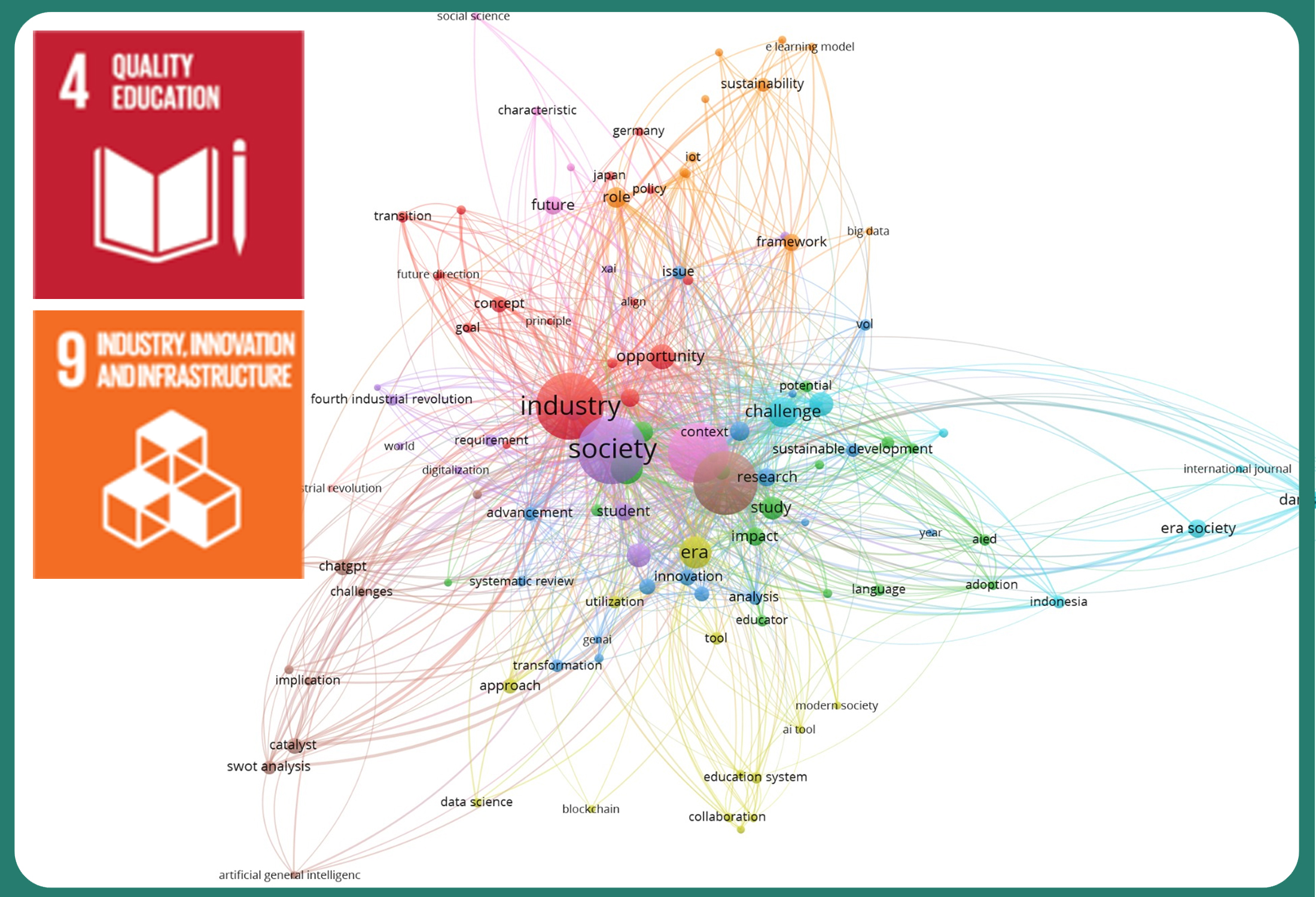Artificial Intelligence in Education: Opportunities and Challenges in the Transition from Industry 4.0 to Society 5.0
DOI:
https://doi.org/10.24036/javit.v5i1.257Keywords:
Artificial Intelligence, Education, Industry 4.0, Society 5.0, Bibliometric Analysis, VOSviewer, Adaptive Learning, Digital TransformationAbstract
The integration of Artificial Intelligence (AI) into education has become increasingly relevant in the era of Industry 4.0 and the transition toward Society 5.0. This study aims to provide a bibliometric analysis of research trends, thematic clusters, and emerging keywords related to AI in education between 2018 and 2025. Using the Publish or Perish software and data from Google Scholar, 200 articles were selected based on relevance and citation metrics. Keyword co-occurrence analysis and visual mapping were conducted using VOSviewer to identify dominant research themes. The results reveal a growing body of literature focused on AI applications in education, with key topics including adaptive learning, machine learning, digital transformation, and human-centered innovation. However, critical gaps remain, particularly in research addressing cultural context, teacher readiness, digital equity, and the long-term impact of AI-driven tools. This study highlights the need for inclusive, ethical, and context-aware approaches to AI in education, offering insights and recommendations for future research aligned with the human-centric values of Society 5.0
Downloads
References
S. Timotheou et al., “Impacts of digital technologies on education and factors influencing schools’ digital capacity and transformation: A literature review,” Educ. Inf. Technol., vol. 28, no. 6, pp. 6695–6726, Jun. 2023, https://doi.org/10.1007/s10639-022-11431-8.
E. Mukul and G. Büyüközkan, “Digital transformation in education: A systematic review of education 4.0,” Technol. Forecast. Soc. Change, vol. 194, p. 122664, Sep. 2023, https://doi.org/10.1016/j.techfore.2023.122664.
M. L. Nieto-Taborda and R. Luppicini, “Accelerated Digital Transformation of Higher Education in the Wake of COVID-19: A Systematic Literature Review,” Int. J. Chang. Educ., vol. 2, no. 2, pp. 123–138, Sep. 2025, https://doi.org/10.47852/BONVIEWIJCE42023125.
Y. Xu et al., “Artificial intelligence: A powerful paradigm for scientific research,” Innovation, vol. 2, no. 4, Nov. 2021, https://doi.org/10.1016/j.xinn.2021.100179.
I. Celik, E. Gedrimiene, S. Siklander, and H. Muukkonen, “The affordances of artificial intelligence-based tools for supporting 21st-century skills:,” Australas. J. Educ. Technol., vol. 40, no. 3, pp. 19–38, Jun. 2024, https://doi.org/10.14742/ajet.9069.
A. J. Kess-Momoh, S. T. Tula, B. G. Bello, G. B. Omotoye, and A. I. Daraojimba, “Strategic human resource management in the 21st century: A review of trends and innovations,” https://wjarr.co.in/sites/default/files/WJARR-2024-0105.pdf, vol. 21, no. 1, pp. 746–757, Jan. 2024, https://doi.org/10.30574/WJARR.2024.21.1.0105.
J. E. (Hans. Korteling, G. C. van de Boer-Visschedijk, R. A. M. Blankendaal, R. C. Boonekamp, and A. R. Eikelboom, “Human- versus Artificial Intelligence,” Front. Artif. Intell., vol. 4, p. 622364, Mar. 2021, https://doi.org/10.3389/frai.2021.622364.
G. Zhao, Y. Li, and Q. Xu, “From Emotion AI to Cognitive AI,” Int. J. Netw. Dyn. Intell., pp. 65–72, Dec. 2022, https://doi.org/10.53941/ijndi0101006.
I. H. Sarker, “AI-Based Modeling: Techniques, Applications and Research Issues Towards Automation, Intelligent and Smart Systems,” SN Comput. Sci., vol. 3, no. 2, pp. 1–20, Mar. 2022, https://doi.org/10.1007/s42979-022-01043-x.
W. Strielkowski, V. Grebennikova, A. Lisovskiy, G. Rakhimova, and T. Vasileva, “AI-driven adaptive learning for sustainable educational transformation,” Sustain. Dev., vol. 33, no. 2, pp. 1921–1947, Apr. 2024, https://doi.org/10.1002/sd.3221.
K. Wongmahesak, F. Karim, and N. Wongchestha, “Artificial Intelligence: A Catalyst For Sustainable Effectiveness In Compulsory Education Management,” Asian Educ. Learn. Rev., vol. 3, no. 1, pp. 4–4, 2025, https://doi.org/10.14456/AELR.2025.4.
Dr. Lohans Kumar Kalyani, “The Role of Technology in Education: Enhancing Learning Outcomes and 21st Century Skills,” Int. J. Sci. Res. Mod. Sci. Technol., vol. 3, no. 4, pp. 05–10, Apr. 2024, https://doi.org/10.59828/ijsrmst.v3i4.199.
J. Hutson and J. Ceballos, “Rethinking Education in the Age of AI: The Importance of Developing Durable Skills in the Industry 4.0,” J. Inf. Econ., vol. 1, no. 2, pp. 26–35, Jul. 2023, https://doi.org/10.58567/jie01020002.
A. Khang, B. Jadhav, and S. Birajdar, “Industry Revolution 4.0: Workforce Competency Models and Designs,” Des. Work. Manag. Syst. Ind. 4.0 Data-Centric AI-Enabled Approaches, pp. 11–34, Jan. 2023, https://doi.org/10.1201/9781003357070-2.
F. Kamalov, D. Santandreu Calonge, and I. Gurrib, “New Era of Artificial Intelligence in Education: Towards a Sustainable Multifaceted Revolution,” Sustain. 2023, Vol. 15, Page 12451, vol. 15, no. 16, p. 12451, Aug. 2023, https://doi.org/10.3390/SU151612451.
R. M. Oosthuizen, “The Fourth Industrial Revolution – Smart Technology, Artificial Intelligence, Robotics and Algorithms: Industrial Psychologists in Future Workplaces,” Front. Artif. Intell., vol. 5, p. 913168, Jul. 2022, https://doi.org/10.3389/frai.2022.913168.
V. J. Owan, K. B. Abang, D. O. Idika, E. O. Etta, and B. A. Bassey, “Exploring the potential of artificial intelligence tools in educational measurement and assessment,” Eurasia J. Math. Sci. Technol. Educ., vol. 19, no. 8, p. em2307, Aug. 2023, https://doi.org/10.29333/EJMSTE/13428.
D. M. Heeg and L. Avraamidou, “The use of Artificial intelligence in school science: a systematic literature review,” EMI. Educ. Media Int., vol. 60, no. 2, pp. 125–150, Apr. 2023, https://doi.org/10.1080/09523987.2023.2264990.
P. Akpamah and A. Matkó, “Information Technology deployment in Human Resource Management: A case study in deprived regions,” Int. Rev. Appl. Sci. Eng., vol. 13, no. 1, pp. 1–10, Jul. 2021, https://doi.org/10.1556/1848.2021.00278.
X. Yao, N. Ma, J. Zhang, K. Wang, E. Yang, and M. Faccio, “Enhancing wisdom manufacturing as industrial metaverse for industry and society 5.0,” J. Intell. Manuf., vol. 35, no. 1, pp. 235–255, Jan. 2024, https://doi.org/10.1007/S10845-022-02027-7/METRICS.
I. Gagnidze, “Industry 4.0 and industry 5.0: can clusters deal with the challenges? (A systemic approach),” Kybernetes, vol. 52, no. 7, pp. 2270–2287, Jul. 2023, https://doi.org/10.1108/K-07-2022-1005/FULL/XML.
D. A. S. George and A. S. H. George, “Towards a Super Smart Society 5.0: Opportunities and Challenges of Integrating Emerging Technologies for Social Innovation,” Partners Univers. Int. Res. J., vol. 3, no. 2, pp. 01–29, Jun. 2024, https://doi.org/10.5281/ZENODO.11522048.
N. Donthu, S. Kumar, D. Mukherjee, N. Pandey, and W. M. Lim, “How to conduct a bibliometric analysis: An overview and guidelines,” J. Bus. Res., vol. 133, pp. 285–296, Sep. 2021, https://doi.org/10.1016/J.JBUSRES.2021.04.070.
S. Paek and N. Kim, “Analysis of Worldwide Research Trends on the Impact of Artificial Intelligence in Education,” Sustain. 2021, Vol. 13, Page 7941, vol. 13, no. 14, p. 7941, Jul. 2021, https://doi.org/10.3390/SU13147941.
H.-C. Koong Lin et al., “Transforming Education: A Comprehensive Review of Generative Artificial Intelligence in Educational Settings through Bibliometric and Content Analysis,” Sustain. 2023, Vol. 15, Page 12983, vol. 15, no. 17, p. 12983, Aug. 2023, https://doi.org/10.3390/SU151712983.
M. Tedre et al., “Teaching machine learning in K-12 Classroom: Pedagogical and technological trajectories for artificial intelligence education,” IEEE Access, vol. 9, pp. 110558–110572, 2021, https://doi.org/10.1109/ACCESS.2021.3097962.
M. Al-Emran, B. Abu-Hijleh, and A. R. A. Alsewari, “Exploring the Effect of Generative AI on Social Sustainability Through Integrating AI Attributes, TPB, and T-EESST: A Deep Learning-Based Hybrid SEM-ANN Approach,” IEEE Trans. Eng. Manag., 2024, https://doi.org/10.1109/TEM.2024.3454169.
E. Hosseini, K. Taghizadeh Milani, and M. S. Sabetnasab, “Development and maturity of co-word thematic clusters: the field of linked data,” Libr. Hi Tech, vol. 43, no. 1, pp. 81–113, Feb. 2023, https://doi.org/10.1108/LHT-10-2022-0488/FULL/XML.
P. Dunleavy and H. Margetts, “Data science, artificial intelligence and the third wave of digital era governance,” Public Policy Adm., 2023, https://doi.org/10.1177/09520767231198737.
C. Verma, P. Vijayalakshmi, N. Chaturvedi, U. Umesh, A. Rai, and A. Y. A. Bani Ahmad, “Artificial Intelligence in Marketing Management: Enhancing Customer Engagement and Personalization,” 2025 Int. Conf. Pervasive Comput. Technol. ICPCT 2025, pp. 397–401, 2025, https://doi.org/10.1109/ICPCT64145.2025.10940626.

Downloads
Published
How to Cite
Issue
Section
License
Copyright (c) 2025 Indra Pratama Putra, Muhammad Adri, Dedy Irfan

This work is licensed under a Creative Commons Attribution 4.0 International License.










